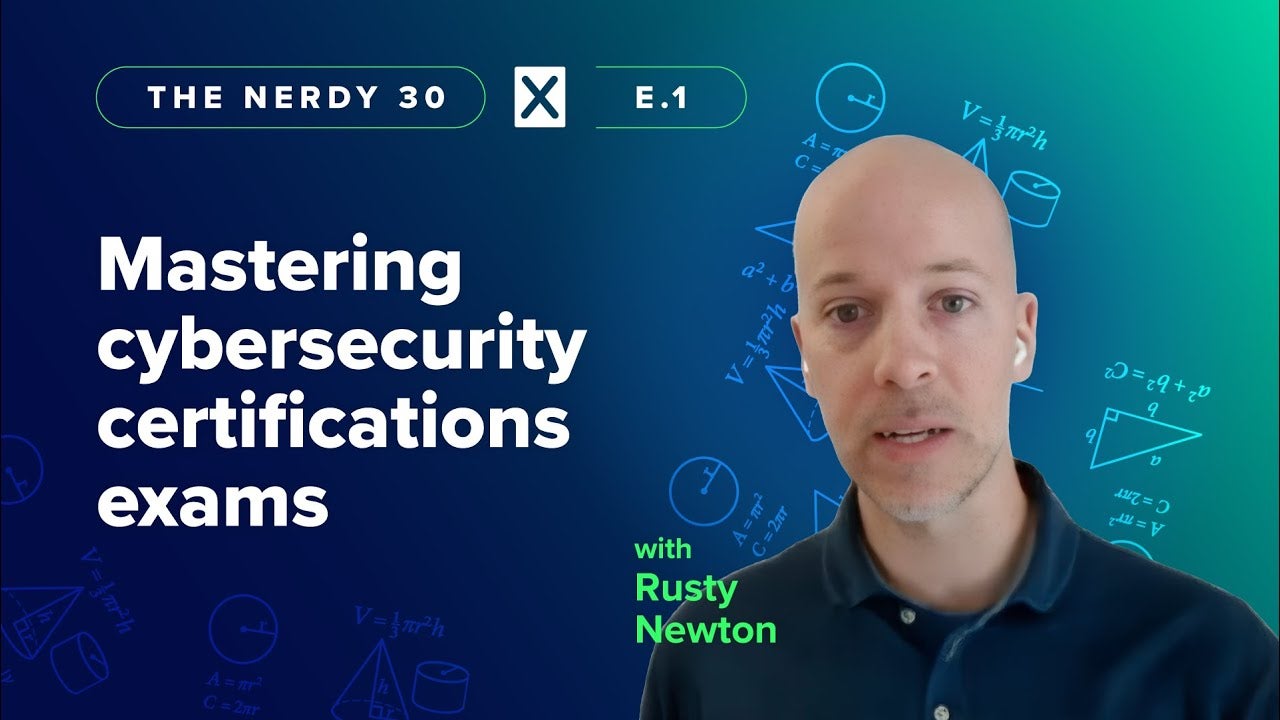Videos · Ben Baker
A comprehensive guide to studying for cyber security certifications featuring proven learning strategies based on cognitive psychology and real-world experience from cyber security professionals.
Date: July 16, 2025
Duration: ~30 minutes
Featuring:
- Ben Baker, Director of Content, Expel (Host)
- Rusty Newton, Principal Security Solutions Engineer, Expel
Additional resources
- Download the free Anki flashcard software mentioned in the session
- Explore Learning Scientists for evidence-based study strategies
- Read about the forgetting curve and memory research
- Check out upcoming Nerdy 30 sessions on LinkedIn Events
Introduction
Ben Baker: Welcome everyone to the first episode of the Nerdy 30, a focused 30-minute series designed to deliver practical cyber security knowledge. Today we’re tackling one of the most requested topics from our community: how to effectively study for cyber security certifications.
Whether you’re pursuing your first IT certification like CompTIA Security+ or advancing to expert-level credentials like CISSP, CISA, or CISM, the study strategies we’ll cover apply across all cyber security certifications. We know that preparing for cyber security exams can feel overwhelming, especially when balancing work, life, and learning new technical concepts.
For those unfamiliar with Expel, we’re a managed detection and response (MDR) provider that helps organizations detect and respond to cyber threats 24/7. Our team includes professionals with diverse certification backgrounds, from cloud security certifications to incident response credentials, giving us unique insights into what certifications matter most in today’s cyber security landscape.
Why study strategies matter for cyber security certifications
Ben Baker: Rusty, you’ve earned over 20 industry certifications and have an MBA. What makes studying for cyber security certifications different from other types of learning?
Rusty Newton: That’s a great question, Ben. Cyber security certifications are unique because they test both technical knowledge and practical application. Unlike general IT certifications that might focus on specific technologies, cyber security exams require you to think like both an attacker and a defender.
The key difference is that cyber security concepts build on each other. Understanding network security requires foundational knowledge of networking. Cloud security certifications assume you know both cloud architecture and security principles. This interconnected nature means your study approach needs to be more strategic.
What I’ve learned through earning certifications from AWS, Microsoft, CompTIA, and ISC2 is that the most successful certification candidates don’t just memorize facts—they understand how security concepts relate to each other and to real-world scenarios.
The science-based approach to certification success
Ben Baker: You mentioned being passionate about the science of learning. How does this apply to cyber security certifications?
Rusty Newton: The research is clear: most people study ineffectively. They read books, take notes, and reread those notes—but studies show this is one of the least effective methods for retention.
For cyber security certifications, you need strategies based on cognitive psychology. The key is understanding the forgetting curve—research from Hermann Ebbinghaus showing how quickly we lose information over time. Cyber security professionals need to combat this because we’re constantly learning new threats, tools, and techniques.
The most effective approach combines:
- Spaced repetition: Reviewing information at increasing intervals
- Active recall: Testing yourself instead of passive reading
- Interleaving: Mixing different but related topics (like studying firewalls and network protocols together)
- Elaboration: Explaining concepts in your own words
These aren’t just academic theories—I’ve used them to pass certifications in cyber security, cloud computing, and business management while working full-time.
Identifying knowledge gaps in cyber security domains
Ben Baker: Before diving into study materials, how should someone assess their current knowledge for a cyber security certification?
Rusty Newton: This is crucial and often overlooked. Start with the exam objectives—every major certification provider publishes these. For example, if you’re studying for CISSP, ISC2 provides detailed domain breakdowns. CompTIA does the same for Security+, CySA+, and CASP+.
But here’s the key: take a practice exam first, before opening any study materials. Use it as a diagnostic tool, not practice. This approach works whether you’re pursuing:
- Entry-level certifications like Security+ or Network+
- Professional certifications like CISSP, CISA, or CISM
- Technical certifications like CEH or GSEC
- Cloud security certifications from AWS, Microsoft, or Google
The practice exam will show you exactly where your knowledge gaps are. Maybe you’re strong in network security but weak in governance and compliance. This targeted approach saves enormous time—instead of studying everything equally, you focus on your weak areas.
Certification Study Tip: Most practice exam platforms provide detailed breakdowns by domain. Use this data to create a weighted study plan focusing 80% of your time on weak areas and 20% on reinforcing strong areas.
The Anki method for cyber security concepts
Ben Baker: You mentioned using flashcard software called Anki. How does this work for complex cyber security concepts?
Rusty Newton: Anki is a game-changer for cyber security certifications because it uses spaced repetition algorithms based on the forgetting curve research. Unlike traditional flashcards, Anki shows you information right before you’re likely to forget it.
For cyber security, this is perfect because we need to retain vast amounts of interconnected information:
- Security frameworks like NIST, ISO 27001, and COBIT
- Technical concepts like encryption algorithms, network protocols, and attack vectors
- Compliance requirements for various regulations
- Incident response procedures and forensics techniques
Here’s how some create Anki cards for cyber security topics:
Instead of: “What is a firewall?”
Create: “You need to allow HTTP traffic while blocking direct database access. What security control would you implement and how would you configure it?”
This approach mimics real certification exam questions and builds practical knowledge you’ll use on the job.
The beauty of Anki is that it works during small time windows—reviewing cards during commutes, breaks, or waiting periods. This fits perfectly into busy cyber security professional schedules.
Active learning techniques for technical content
Ben Baker: Beyond flashcards, what other active learning strategies work well for cyber security certifications?
Rusty Newton: Active learning is about engagement and cognitive challenge. For cyber security certifications, this means working with the information, not just consuming it.
Effective techniques include:
Whiteboarding: Draw network diagrams, incident response flowcharts, or security architecture designs. Visual learning is powerful for understanding how security controls interact.
Teach-back method: Explain cyber security concepts to colleagues, friends, or even record yourself. If you can’t explain it simply, you don’t understand it well enough.
Scenario-based thinking: For every security control you study, ask “When would this fail?” and “What would an attacker do?” This mirrors how certification exams test your knowledge.
Lab practice: Set up virtual environments to practice with security tools. Many certification providers offer lab access, and platforms like TryHackMe or Cybrary provide hands-on experience.
Case study analysis: Study real breach reports and map them to certification frameworks. This builds the analytical thinking skills tested in advanced certifications like CISSP or CISM.
The key is making your brain work with the information rather than passively receiving it. This builds the neural pathways needed for both exam success and practical application.
Managing study time and maintaining focus
Ben Baker: Cyber security professionals are busy. How can they efficiently manage study time while maintaining attention during learning sessions?
Rusty Newton: Time management is critical for certification success. Research shows that shorter, focused study sessions are more effective than marathon cramming sessions.
My recommended approach:
Time blocking: Schedule 45-60 minute focused study blocks rather than trying to find 3-4 hour chunks. Most cyber security professionals can find an hour but struggle to clear entire evenings.
The Pomodoro Technique: 25 minutes of focused study, 5-minute break, repeat. During breaks, avoid phones and social media—take a walk or do brief exercises.
Attention maintenance strategies:
- Study during your peak energy hours (often mornings for most people)
- Use background music without lyrics—electronic or instrumental works well
- Eliminate distractions: phone in another room, close unnecessary browser tabs
- Change study locations occasionally to maintain novelty
The “nappuccino”: For afternoon energy crashes, have caffeine then immediately take a 15-20 minute rest with eyes closed. The caffeine kicks in as you “wake up,” providing a powerful energy boost.
Study environment: Create a dedicated study space associated only with learning. Your brain will begin to focus automatically when you enter this space.
Exam day optimization for cyber security certifications
Ben Baker: After weeks or months of preparation, how should someone approach the actual exam day?
Rusty Newton: Exam day preparation is often overlooked, but it can make the difference between passing and failing, especially with challenging certifications like CISSP or CISA.
Pre-exam optimization:
Timing: Schedule exams during your peak cognitive hours. Most people perform best mid-morning (10-11 AM) after caffeine has taken effect but before afternoon energy crashes.
Physical preparation:
- Light exercise before the exam can improve memory recall
- Eat familiar foods—avoid trying new things on exam day
- Some people perform better fasting; experiment during practice sessions
Final review: The morning of your exam, do a quick review of your Anki cards focusing on your historically weakest areas. Don’t try to learn new material.
Confidence building: By exam day, you should be consistently scoring well on practice exams. This confidence is crucial for performance under pressure.
Technical setup: For online proctored exams, test your equipment beforehand. Have backup internet connections and ensure your testing environment meets requirements.
During the exam: Use the brain dump technique—write down key formulas, frameworks, or mnemonics as soon as the exam starts while they’re fresh in your memory.
AI-enhanced study strategies for modern cyber security
Ben Baker: AI tools are transforming every field, including education. How can cyber security professionals leverage AI in their certification studies?
Rusty Newton: AI is a powerful study partner when used correctly. The key is using it to enhance understanding, not replace critical thinking.
Effective AI applications:
Concept clarification: When studying complex topics like cryptographic algorithms or cloud security architectures, ask AI tools for different explanations or analogies until you find one that clicks.
Practice question generation: AI can create custom practice questions based on specific certification domains or your weak areas identified through practice exams.
Memory aids: Ask AI to create mnemonics, acronyms, or memory palaces for complex cyber security frameworks like NIST CSF or ISO 27001 controls.
Scenario analysis: Present AI with cyber security scenarios and ask for analysis from different perspectives—technical, business, compliance, and risk management.
Study plan optimization: Use AI to help create personalized study schedules based on your available time, learning pace, and certification deadlines.
Important caveats: Always verify AI-generated information against official certification materials. AI can hallucinate incorrect technical details, which is particularly dangerous for cyber security concepts where accuracy is critical.
FAQ 1: Beyond individual certifications, how should cyber security professionals think about building a comprehensive certification portfolio?
Cyber security certification strategy should align with career goals and market demand. The field is diverse enough that you can specialize deeply or maintain broad expertise.
Strategic approaches:
Foundation first: Start with broad certifications like Security+ or CySA+ before specializing. These provide the fundamental knowledge needed for advanced certifications.
Vendor vs. vendor-neutral: Balance vendor-specific certifications (AWS Security, Microsoft Security) with vendor-neutral credentials (CISSP, CISA). Vendor certs show technical depth; neutral certs demonstrate broad understanding.
Experience requirements: Plan for certifications with experience requirements. CISSP requires 5 years; CISA requires 5 years. Use associate-level versions while building experience.
Continuous learning: The cyber security threat landscape evolves rapidly. View certifications as learning milestones, not endpoints. Maintain CPE requirements through continuous education.
Market alignment: Research job postings in your target roles. Cloud security roles often require AWS/Azure certifications. GRC roles value CISA/CISM. Incident response roles prefer GCIH/GCFA.
Industry-specific considerations: Healthcare organizations value HCISPP; financial services prefer CAMS or FRM; government contractors need Security+ or CISSP.
FAQ 2: What are the biggest obstacles people face when studying for cyber security certifications, and how can they overcome them?
When studying for cyber security certifications, several challenges appear consistently:
Challenge 1: Information overload Solution: Use the diagnostic approach we discussed. Focus study time on knowledge gaps rather than reviewing everything equally.
Challenge 2: Imposter syndrome Solution: Remember that certifications test baseline competency, not expertise. You don’t need to know everything perfectly—you need to demonstrate minimum proficiency.
Challenge 3: Work-life balance Solution: Integrate study into daily routines. Review flashcards during commutes, listen to security podcasts during workouts, discuss concepts with colleagues.
Challenge 4: Technical complexity Solution: Build knowledge incrementally. Master networking fundamentals before tackling advanced security concepts. Use analogies and visual aids for complex topics.
Challenge 5: Exam anxiety Solution: Take multiple practice exams under timed conditions. Familiarize yourself with question formats and testing environments. Practice stress management techniques.
Challenge 6: Keeping up with changes Solution: Follow certification provider updates, join professional communities, and maintain awareness of evolving cyber security threats and technologies.
FAQ 3: Beyond passing specific exams, how can cyber security professionals develop sustainable learning practices?
Cyber security is a field where continuous learning isn’t optional—it’s essential for career survival and security effectiveness.
Sustainable learning strategies:
Microlearning: Dedicate 15-20 minutes daily to learning something new. This could be reading threat intelligence reports, reviewing new vulnerabilities, or studying emerging technologies.
Community engagement: Join cyber security communities like ISACA, ISC2 chapters, or local security meetups. Learning from peers accelerates understanding and provides real-world context.
Hands-on practice: Set up home labs for experimenting with security tools and techniques. Platforms like VirtualBox or VMware make this accessible and affordable.
Teaching others: Mentor junior professionals or contribute to community education. Teaching reinforces your own understanding while building professional networks.
Cross-functional learning: Study adjacent fields like business, law, or technology management. Cyber security increasingly requires understanding business impact and regulatory requirements.
Reflection and application: After learning new concepts, reflect on how they apply to your current role and organization. This builds practical wisdom beyond theoretical knowledge.
Industry context: the current certification landscape
Cyber security certification market insights:
The cyber security certification market continues evolving rapidly. According to recent industry analysis, demand for certified cyber security professionals has grown 25% year-over-year, with certain specializations experiencing even higher growth:
- Cloud security: AWS, Microsoft, and Google cloud security certifications are increasingly required as organizations migrate to cloud infrastructure
- Privacy and compliance: GDPR, CCPA, and emerging privacy regulations drive demand for privacy-focused certifications like CIPM and CIPT
- DevSecOps: Integration of security into development processes creates demand for certifications bridging security and development skills
- Risk management: Business-aligned certifications like CRISC and CISA show strong job market growth as organizations focus on cyber risk quantification
External resources for cyber security certification success
Essential study resources:
- CompTIA Learning Resources for foundational cyber security knowledge
- ISC2 Official Study Materials for advanced security certifications
- SANS Training for hands-on technical skills
- Cybrary for free cyber security education and lab environments
- Professor Messer for CompTIA certification preparation
- Learning Scientists for evidence-based study strategies
Practice exam platforms:
- Boson ExSim for technical certification practice
- MeasureUp for Microsoft and Cisco certifications
- Kaplan IT Training for comprehensive exam preparation
- Transcender for adaptive practice testing
Professional communities:
- ISACA for governance, risk, and audit professionals
- ISC2 for information security practitioners
- CompTIA IT Professionals Association for IT career development
- SANS Community for technical security practitioners
This transcript has been edited for clarity and readability. The strategies discussed are based on cognitive psychology research and real-world experience but should be adapted to individual learning styles and circumstances.
For more cyber security education and professional development resources, visit expel.com/blog or follow our LinkedIn page for updates on future Nerdy 30 sessions.






